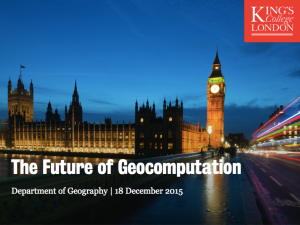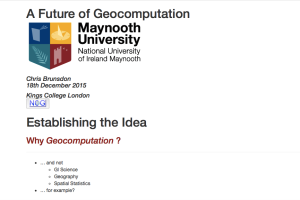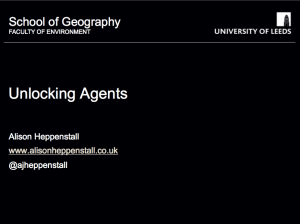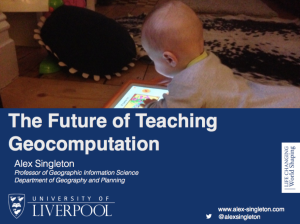On Friday 18 December, we hosted a workshop on ‘the future of geocomputation’ involving over 30 researchers from across the UK and Ireland. We’re still working to synthesise and write up the discussions that made up the second half of the workshop, but below are the presentations that kicked off the day. Some of the tweets from the day are embedded below but from more see our storify for the day or search #fogeocomp.
Introduction
To set the context for the day’s discussion we argued that the future of geography is cheap – cheap hardware and software, cheap data and code, and ‘cheap’ (by which we mean simple) interaction with sophisticated geographical models.
Chris Brunsdon’s Keynote
In his opening keynote, Chris set out an ambitious agenda for geocomputation that called for a deeper understanding of geographical processes, data visualisation (with provocative images from his caricRture library) and, most challenging of all, Approximate Bayesian Computation (ABC).
Chris highlighted some of the problems with GIS and argued that geographers need to rediscover coding for reproducibility, for flexibility and for openness in their research.
Alison Heppenstall’s Keynote
Alison’s talk rounded out Chris’ preliminaries, highlighting the role that Agent-Based Models (ABMs) could play in deepening our understanding of spatial processes by bringing aspects of the real world and human behaviour into our computational models. We see these as complementary to, rather than competing with, the more statistical aspects explored by Chris.
Alison also highlighted that despite the large number of platforms that have been developed now for agent-based modelling, and its growing use across academia, its adoption and use in policy-making has been limited. Alison puts this down to the great uncertainties that often remain and argued a need for increased focus on model calibration and verification.
Alex Singleton’s Keynote
Finally, Alex wrapped up with his thoughts on how we can train the next generation of students in the tools and concepts that they will need to get to grips with the issues explored by Alison and Chris.
Alex pointed out how ‘point-and-click’, button-pushing GIS classes in undergraduate degree programmes fails to teach anything about the process of data analysis and research and called for us to move beyond ‘sleepy’ geography curricula.
Discussion
After the keynotes we broke into smaller groups to discuss Training the Next Generation, Data, Tools & Processes and Setting an Agenda for the next 10 Years. We’re still working on summarising and synthesising the discussions from these groups so look out for that soon.
Before finishing and continuing discussions over wine, Andy Evans from University of Leeds outlined plans for the Geocomputation 2017 conference. We’re looking forward to that already but there’s more to come in 2016 first!



